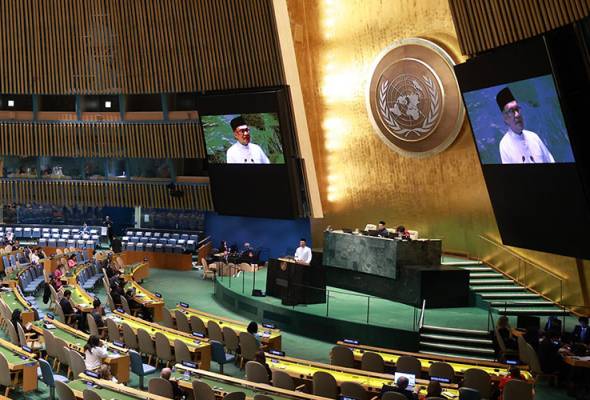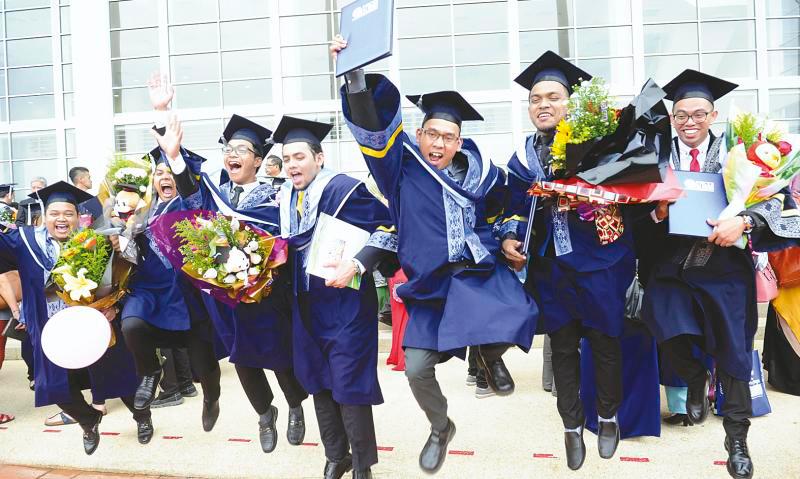
Published by AstroAwan & FocusMalaysia, image by AstroAwani.
Speaking at any event organized by the United Nations (UN) is never a missed opportunity. This is especially the case with the UN General Assembly, which is held throughout the month of September each year. Heads of government take turns to express the views to reflect on the issues that affect the world over and again.
The late Jeanne Kirkpatrick at Georgetown University, who once served as the Permanent Representative of the United States (US) to the UN Security Council during the Reagan Administration even has this to say: “The UN General Assembly is a Turkish Bath.” For the lack of better expression, she was not referring to UNGA strictly as a talk shop.
Rather, she was alluding to how world leaders, occasionally activists such as the likes of Yasser Arafat, Chairman of the Palestinian Liberation Organization (PLO) were once allowed to speak at the UNGA.
By allowing leaders to let off their steam, even to hyper ventilate, by excoriating others of their sins of ommission and commission, some leaders would become less antagonistic and amenable to dialogue to resolve an issues.
It is not always the case that such a rostrum would work flawlessly to prevent great wars, endemic conflicts and a world economy filled with debauchery, let alone to protect the world from all sorts of mayhem, especially extreme climate, but it allows all and sundry to unleash their emotions.
As Professor Neta Crawford at University of Oxford once said: “Of all the variables that are important to world politics, emotion is one that is the least studied.” This despite the fact that it is emotion —- in raw and calculated form —- that can suddenly precipitate a war.
“The fact is if there is no UN General Assembly, one would have to be created for it. By this token, it is important to note that Prime Minister Anwar Ibrahim also gave a Friday sermon at a mosque in New York not too far from Turtle’s Bay where the Headquarter of the UN is located. While the congregation was not formed of UN bureaucrats, the message he delivered was important. A believer must demonstrate good character, personify the sophistication of understanding various issues and be the bearer of his or her faith and knowledge.
At any rate, the UNGA is indeed a global platform that can allow leaders to speak to the audience, either physically or virtually, to douse the ambers of any controversial subject into one that is less acerbic and belligerent. It does not mean that UNGA can stop all wars and conflicts. But without UNGA, there would be even more of them.
Besides, the UNGA is an event that poses a grave political danger to those leaders who are actually committed to attending the event by flying to New York City.
Given the fixed speaking arrangement, once a leader has agreed to speak at the UNGA, his or her political nemesis, including the people whom they govern, can seize on the opportunity when the leader and his cabinet members are abroad, to launch a coup or a power grab.
This happened to ex Prime Minister Thaksin Shinawatra of Thailand in September 2006.
When he was unseated by the Thai military, his Tai Rak Thai Party was banned and the parliament momentarily suspensed.
It would take another 17 years before Thaksin Shinawatra would return to Thailand with a sentence of eight years, that was then reduced by the monarchy to one year. Only the brave dares to take the risk of attending the UNGA.
Since the risk is high, it is the case that the trip to UN is not all about UN alone. If anything else, the key rests with his sidebar activities. In any attempt to judge any leader’s presence in UNGA as a failed opportunity, the critic truly has to understand international relations, in depth.
Such a metric does not imply he or she has written various book chapters, academic papers and many opinion editorials. Output does not signify quality. The late Professor Leo Gross, for example, did not write that many books and papers. Yet, he is a known entity in the world of international legal studies to this day.
As the former editor of the American Society of International Law (ASIL), Professor Leo Gross at Harvard University and the Fletcher School of Law and Diplomacy at one stage, was concurrently the “Book Review” editor.
Leo Gross became a powerful and lucid critique of any books on world issues and international law. Thus, continuing the fine tradition of his mentor the late Professor Hans Kelsen too. Another person who hardly writes but has become a solid book critic at the New York Times is Michiku Tani. Each and every book review drips with superb clarity.
In looking at the likes of some who spoke of Prime Minister Anwar Ibrahim’s “missed opportunity at the UN,” such as the piece by one Colin Koh at University of Malaya, one must add that Prime Minister Anwar Ibrahim did not just address the UN only.
Prime Minister Anwar Ibrahim was also there to engage American policy makers, large would be investors, leading intellectuals at the Council for Foreign Relations —- one of the oldest think tanks in the West —- and old friends in the US too. These interactions would pave the way for his Asia Pacific Economic Cooperation (APEC) in San Francisco this November 2023.
At the sideline of the UNGA both before and after his speech, Prime Minister Anwar Ibrahim also met with leaders of Indonesia, Turkey and Iran to name but a few. Through these meetings, the likes of them would try to understand how the developing world can all unite into a more cohesive whole, when all of them are facing the issues of global inflation and unstable supply chain on anything ranging from food to fuel.
To anyone unconvinced that Prime Minister Anwar Ibrahim has not touched on any substantive issues, one might one to hear his approach to South China Sea and the works with Bloomberg, which was arranged in New York City.
There is also his engagement with the audience at the Council for Foreign Relations that can give an outlook into his method in projecting Malaysia foreign policy outlook beyond what the Ministry of Foreign Affairs or Wisma Putra has been actively doing. In all, it is far too easy to be a dismissive armchair critic.
But given the delicate return of intense geo politics and geo economics, that have always been there at the backstage of world politics —- during or after the Cold War, even now —- Prime Minister Anwar Ibrahim’s public address at the UNGA should not be taken lightly least of all by anyone who is not clued in to the currents of world politics sui generis.
Dr Rais Hussin is the President and Chief Executive Officer of EMIR Research, a think tank focused on strategic policy recommendations based on rigorous research.

